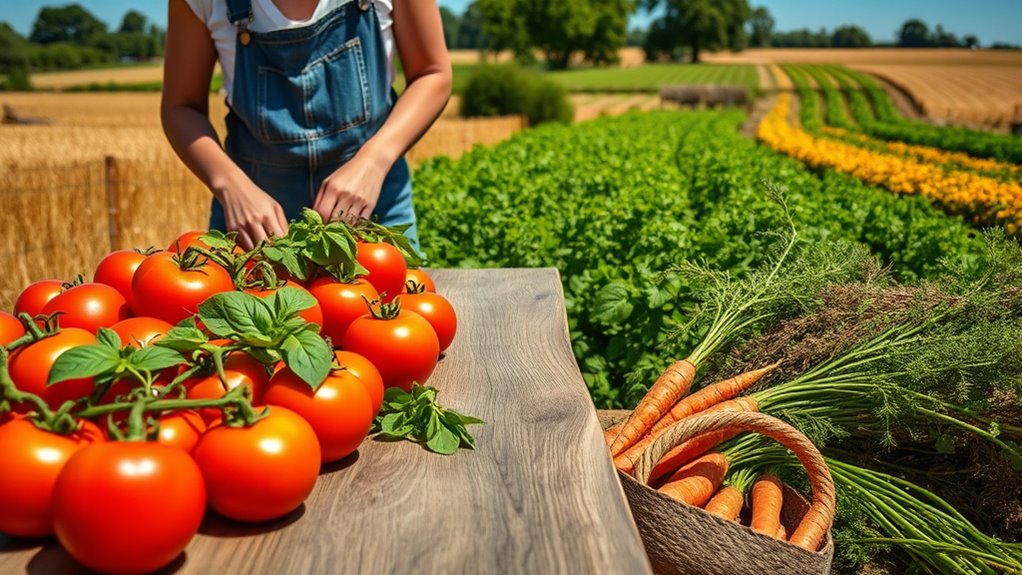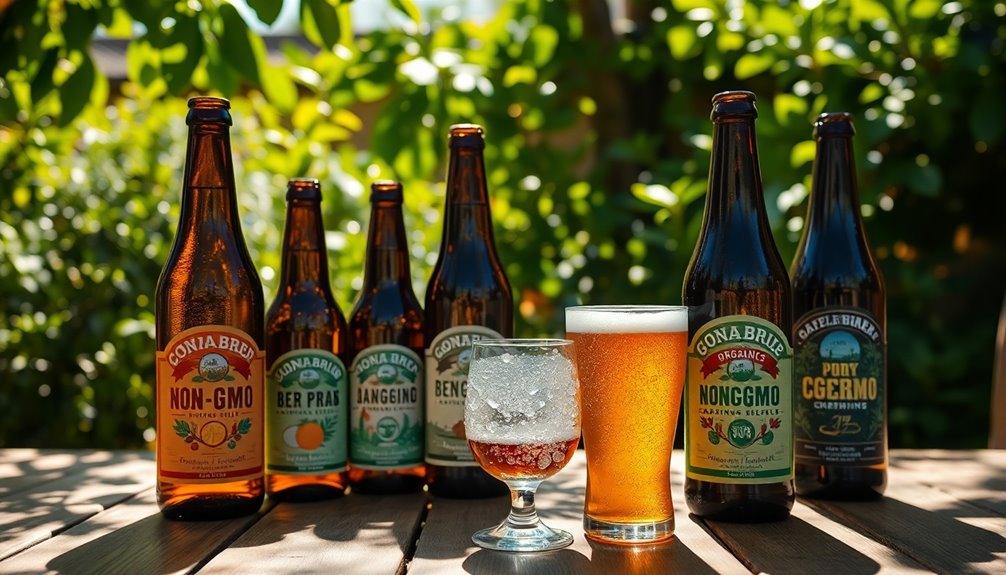Choosing local, farm-fresh foods transforms your dining experience into a meaningful luxury that supports sustainability and cultural traditions. By sourcing directly from local farms, you enjoy fresher, tastier ingredients while reducing environmental impact and fostering resilient communities. It’s about making conscious choices that reconnect you with where your food comes from and how it’s produced. If you keep exploring, you’ll discover how this movement elevates your food choices into powerful acts of environmental and cultural stewardship.
Key Takeaways
- Local food offers fresher, tastier ingredients, elevating the dining experience as a luxury.
- Supporting local farms promotes sustainable practices that protect the environment, making quality food a responsible choice.
- The movement empowers communities through food sovereignty, making access to healthy, culturally relevant options a valued benefit.
- Reduced transportation and packaging lower environmental impact, positioning local food as an eco-conscious luxury.
- Emphasizing food provenance fosters a deeper connection to community and culture, transforming everyday eating into a meaningful luxury experience.

Have you ever wondered where your food really comes from? In today’s world, many of us rely on supermarket shelves filled with produce that’s traveled thousands of miles. But what if you could reconnect with the origins of your food? That’s the essence of the farm-to-table movement, which emphasizes sourcing food directly from local farms. By doing so, you’re not just getting fresher, tastier ingredients—you’re also supporting sustainable farming practices that prioritize environmental health and long-term viability. When you choose local, you’re helping foster food sovereignty, giving communities more control over their food systems and reducing dependence on industrialized agriculture.
Sustainable farming is at the heart of the farm-to-table philosophy. It focuses on methods that protect the land, water, and air, ensuring that farming can continue for generations. When you buy from local farmers practicing sustainable methods, you’re encouraging practices that minimize chemical use, conserve water, and promote biodiversity. This approach keeps the soil healthy and resilient, which in turn produces more nutritious and flavorful food. It’s a conscious choice that aligns with caring for the planet, making your food choices an act of environmental stewardship. Additionally, supporting farmers who prioritize biodiversity helps preserve various species and ecological balances essential for sustainable agriculture.
Food sovereignty plays an essential role in the movement as well. It’s about giving communities the power to decide what to grow and eat, rather than being dictated by large agribusinesses or global supply chains. When you support local farms, you’re contributing to a system that values cultural traditions and local knowledge. This empowers farmers and consumers alike to prioritize food that’s culturally relevant, healthful, and environmentally sustainable. It’s about reclaiming control over your food sources and ensuring that everyone has access to fresh, healthy options.
Choosing to buy local and support farmers who practice sustainable farming isn’t just a trend—it’s a statement of values. It’s about recognizing that food is more than just sustenance; it’s tied to community, culture, and the health of the planet. When you opt for farm-fresh produce, you’re reducing the carbon footprint associated with transportation and packaging. You’re also fostering a resilient local economy that keeps money circulating within your community. This shift toward local food isn’t just a luxury; it’s an indispensable step in creating a more equitable and sustainable food system for everyone. Your choices have the power to influence change, making your meal an act of conscious consumption.

Amazon Basics FSC Certified Sturdy Solid Wood Rectangular Dining Table, Easy Assembly, Kitchen Table, 29.5"D x 47.2"W x 29.5"H, Natural Wood
FSC-CERTIFIED Tables (FSC N004130): Made with materials from well-managed forests, recycled materials, and/or other controlled wood sources
As an affiliate, we earn on qualifying purchases.
Frequently Asked Questions
How Does Local Food Impact Community Health?
Local food boosts community health by offering better nutrition benefits since it’s fresher and retains more nutrients. When you buy local, you support community engagement, strengthening local economies and fostering relationships. This connection encourages healthier eating habits and shared knowledge about food. You’ll notice improved overall well-being, as fresh, nutritious food becomes more accessible, creating a healthier, more connected community for everyone.
What Are the Environmental Benefits of Farm-To-Table Practices?
Think of farm-to-table practices as a invigorating gust of fresh mountain air, revitalizing our planet. By supporting sustainable farming, you reduce carbon footprints and conserve water, while minimizing chemical use. This approach also nurtures biodiversity preservation, creating a vibrant tapestry of life on farms. Your choices help protect ecosystems, promote soil health, and combat climate change—making your food journey a powerful act of environmental stewardship that benefits everyone.
How Can Consumers Verify the Authenticity of Local Produce?
To verify the authenticity of local produce, you should look for farm certification labels on packaging or signage, which confirm the farm’s credibility. You can also ask vendors about their sourcing practices and request details about where and how the food is grown. Additionally, many farmers’ markets provide transparency through direct interactions, allowing you to perform authenticity verification and make certain you’re supporting genuine local producers.
Are There Cost Differences Between Local and Conventional Foods?
Imagine paying a tiny fortune for local foods that seem to glow with freshness—are they really more expensive? The price comparison often shows local produce can be pricier due to shorter supply chains, limited volume, and higher quality. While conventional foods benefit from extensive supply chains that cut costs, your local options might cost a bit more, but they offer unmatched flavor, freshness, and support for your community.
How Does the Farm-To-Table Movement Influence Local Economies?
You see, the farm-to-table movement boosts local economies by supporting farm economics and promoting food sovereignty. When you choose local foods, you help farmers earn fairer wages and keep money within your community. This movement encourages sustainable practices, reduces transportation costs, and strengthens local food systems. As a result, you’re not only enjoying fresh, quality food but also fostering economic resilience and autonomy for local farmers.

Tribesigns 47 inch Round Dining Table Wood Kitchen Table for Dining Room, 47" Dinner Room Tables for 4-6, Farmhouse Accent Furniture with Wooden Tabletop and Cross Base, Burlywood
Ample Seating Capacity and Size: With a generous circumference of 47 inches, the Tribesigns Round Dining Table is...
As an affiliate, we earn on qualifying purchases.
Conclusion
Embracing the farm-to-table movement is like planting seeds of change in your daily life, cultivating a richer connection to your food and community. When you choose local, you’re nourishing not just your body but also the roots of sustainable agriculture and local economies. This movement transforms your plate into a tapestry of freshness and purpose, turning every meal into a deliberate act of kindness—fueling a future where good food and good fortune grow hand in hand.

Muwuele Solid Wood Extendable Dining Table for 4-8 People with Seamless Extension from 47.2 to 63 Inches, Easy Assembly, Expandable Tables for Small Spaces, Dining Room, Kitchen, Living Room, Walnut
【TABLE ONLY & NO CHAIRS】This purchase includes the extendable dining room table only. Chairs shown are for display...
As an affiliate, we earn on qualifying purchases.

Silverware Set for 8, 40 Piece Heavy Duty Stainless Steel Flatware Utensils Cutlery Set Including Steak Knife Fork and Spoon, Dishwasher Safe, Gift Package for Wedding Housewarming
SET OF 40 PIECE: 40pcs stainless steel silverware sets includes 8 of each: Dinner Knives , Dinner Forks...
As an affiliate, we earn on qualifying purchases.










